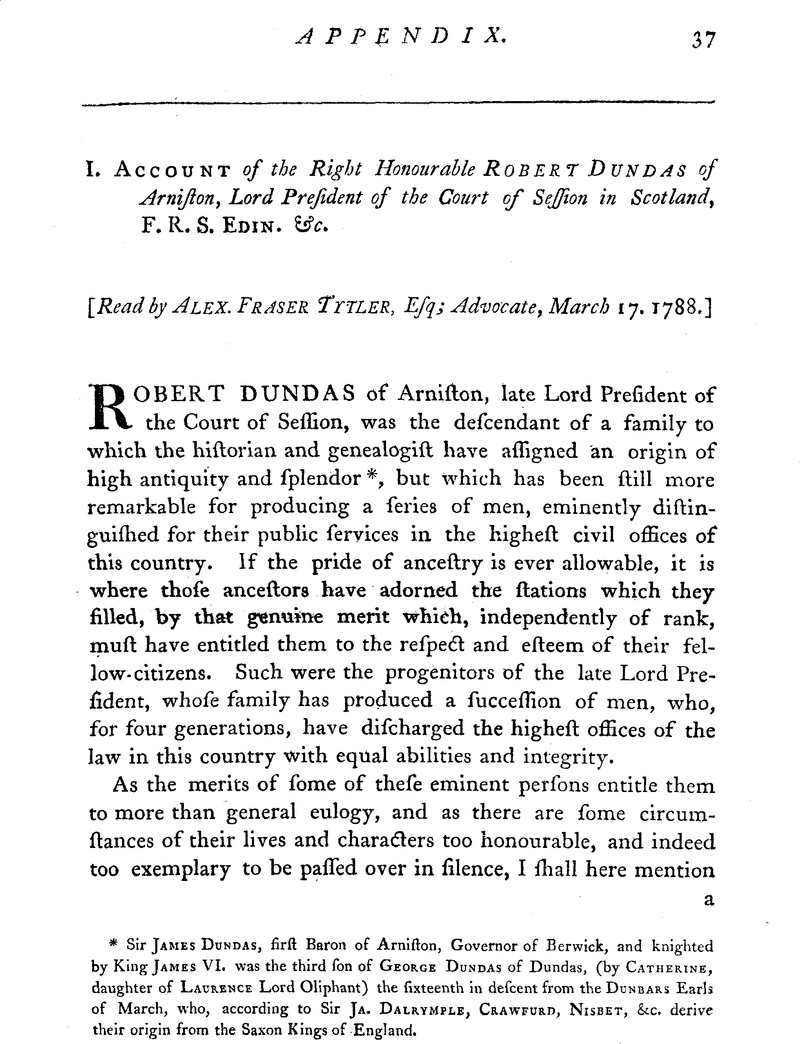Published online by Cambridge University Press: 17 January 2013

page 37 note * Sir James Dundas, first Baron of Arniston, Governor of Berwick, and knighted by King James VI. was the third son of George Dundas of Dundas, (by Catherine, daughter of Laurence Lord Oliphant) the sixteenth in descent from the Dunbars Earls of March, who, according to Sir Ja. Dalrymple, Crawfurd, Nisbet, &C. derive their origin from the Saxon Kings of England.
page 38 note * The contest for the independency of the National Church of Scotland had begun as early as the reign of Alexander I.
page 40 note * They would justify their conduct by the prudent reasoning which Cicero used to Lentulus. “Nam neque pugnandum contra tantas opes, neque delendum, etiam si id “posset, summorum civium principatum, neque pemnanendmn in una sententia, “conversis rebus, ac bonorum voluntatibus immutatis; fed temporibus assentiendum.” Cic. Epist. ad sam. 1.I. ep.9.
page 41 note * Born 9th December 1685. His mother was Margaret, daughter of Sir Robbrt Sinclair of Stevenson.
page 43 note * Mackenzie Crim. Law of Scotland, tit. 23.
page 44 note * James Carnegie of Finhaven, was tried before the Court of Justiciary in Scotland, for the murder of Charles Earl of Strathmore, in 1728. At a meeting in the country, where the company had drank to intoxication, Carnegie of Finhaven having received the most abusive language, and sustained a personal outrage of the grossest nature, from Lyon of Bridgeton, drew his sword, and staggering forward to make a pass at Bridgeton, killed the Earl of Strathmore, a person for whom he had the highest regard and esteem, and who unfortunately came between him and his antagonist, apparently in the view of separating them.
page 52 note * Clarendon.
page 55 note * “From his first entry into the Faculty, he could say he knew, and observed it with
“pleasure, as it tended greatly to their honour, that there was no science, or part of po
“lite and useful learning, for the knowledge of which some in the Faculty were not di
”stinguished, perhaps equally with those who made the several parts of those sciences
“their principal and particular profession. And he hoped he would be excused for re
“commending to them, and to all young gentlemen that might afterwards enter among
“them, to be at pains to maintain and preserve that character and reputation they had
“long held, and still possessed, not only for the knowledge of the Civil or Roman and
“Municipal Laws, and the constitution of their country, but of the other valuable
“branches of learning, that are requisite to accomplish and adorn the character of gen
“tlemen, and were indeed necessary to render them completely qualified for the exercist
“of their profession.” Records of the Fac. of Adv. Nov. 3. 1748.
page 57 note * Since the date of this Memoir, Mr Dundas of Arniston has been appointed his Majesty's Advocate for Scotland, October 31. 1789. The late Lord President Dundas was succeeded in that office by Sir Thomas Miller of Glenlee, who, to the eminent loss of the public, and the sincere regret of all who knew him, died on the eminent loss of the public, and the sincere regret of all who knew him, dided on the 27th day of september 1789. Upon that event, Ilay Campbell Esq; then Lord Advocate, was promoted to the Presidency of the Court of Session, and was succeeded in the office of lord Advocate by Mr Dundas.